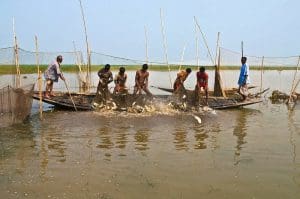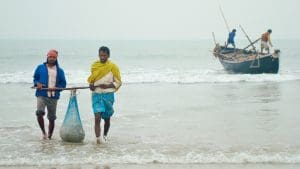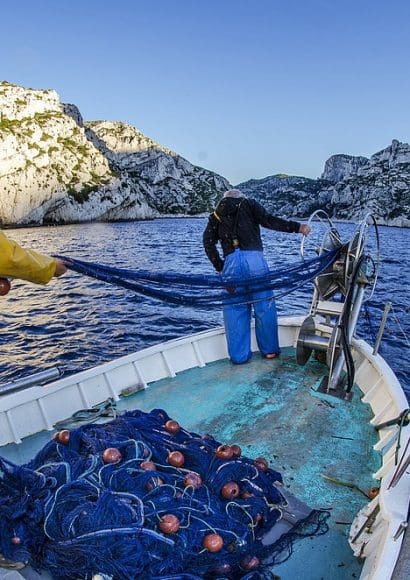
In the vastness of the world’s oceans and rivers, an ancestral activity continues to play a crucial role in food sustainability and local economies: small-scale fisheries. These practices not only significantly contribute to the subsistence of millions of people but are also fundamental for the conservation of marine ecosystems. However, they are often underestimated compared to large-scale fishing industries.
Contents
- What Are Small-Scale Fisheries?🐟
- Economic and Social Importance.🐟
- Challenges and Issues.🐟
- Sustainability in Small-Scale Fisheries.🐟
- The Intersection of Small-Scale Fisheries and Environmental Conservation
- Economic Empowerment and Gender Equality in Small-Scale Fisheries
- Policy and Advocacy for Small-Scale Fisheries.🐟
- Conclusion.🐟
What Are Small-Scale Fisheries?🐟
To understand the importance of small-scale fisheries, we first need to define them. They are characterized by:
-
- Use of traditional techniques: Nets, hand lines, and traps, among other non-industrial methods.
- Small vessels: Generally, boats less than 12 meters in length.
- Family and community-based operations: Run by families or local communities, with a strong cultural and social connection.
These characteristics distinguish them from industrial fisheries, which employ modern techniques and have a global reach.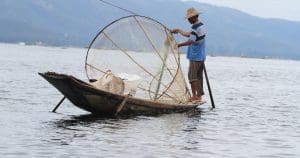
The Perfect Fish and Wine Combination for Your Next Dinner
Pairing the right wine with your fish can elevate your dining experience to new heights. Discover the best combinations of fish and wine to delight your palate. Whether you’re enjoying a delicate white fish with a crisp Sauvignon Blanc or a rich tuna steak with a bold Pinot Noir, the right pairing can enhance the flavors of both the food and the wine. Learn more about perfect fish and wine combination.
Economic and Social Importance.🐟
Sustenance of Local Communities
Small-scale fisheries are vital for the survival of many coastal communities. These activities provide:
-
- Fresh and healthy food: Fish and seafood are essential sources of protein and nutrients.
- Local employment: They generate direct and indirect job opportunities, from fishing to selling in local markets.
- Cultural identity: Traditional fishing is an integral part of local culture and traditions.

Contribution to the Global Economy
Although their impact may seem minor compared to large industries, small-scale fisheries play a crucial role in the global economy:
-
- Economic diversification: They help diversify local economies and reduce dependence on agriculture.
- Local and regional markets: They supply fresh products to markets that would otherwise rely on imports.
Challenges and Issues.🐟
However, small-scale fisheries face numerous challenges. Among them are:
-
- Limited access to resources: Restrictions on land ownership and fishing rights.
- Unfair competition: Pressure from industrial fishing and illegal fishing.
- Climate change: Alterations in fish migration patterns and degradation of marine habitats.
These challenges require comprehensive solutions and policies that support sustainability and equity.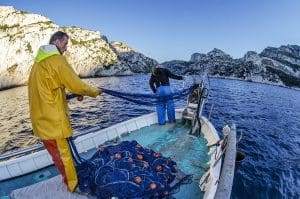
Sustainability in Small-Scale Fisheries.🐟
Sustainable Fishing Practices
Despite the challenges, small-scale fisheries are pioneers in adopting sustainable practices. Some of these practices include:
-
- Respecting closed seasons: Allows species to reproduce.
- Using selective fishing gear: Minimizes bycatch and protects endangered species.
- Community management: Resource management decisions are made collectively by the community.
Ecological Benefits
The sustainability of small-scale fisheries not only benefits local communities but also marine ecosystems. These benefits include:
-
- Conservation of biodiversity: Less invasive fishing techniques help maintain species diversity.
- Healthy ecosystems: Local management ensures that marine habitats remain in good condition.
Innovation and the Future of Small-Scale Fisheries
Technology and Modernization
Although traditional, small-scale fisheries are also adopting technological innovations:
-
- Satellite monitoring systems: Help track fishing patterns and avoid protected areas.
- Mobile applications: Facilitate direct and fair marketing between fishers and consumers.
Education and Training
The future of small-scale fisheries also depends on continuous education and training:
-
- Training in sustainable techniques: Ensures that new generations maintain responsible practices.
- Knowledge of policies and rights: Empowers communities to advocate for their rights and resources.
5 Recipes with Barracuda Fish You Must Try
Barracuda fish, with its firm texture and unique flavor, is a versatile ingredient in the kitchen. Explore five delicious recipes that highlight the best of barracuda fish, from grilled barracuda steaks to spicy barracuda curry. Each recipe brings out the distinctive taste of barracuda, making it a fantastic choice for any seafood lover. Check out these 5 recipes with barracuda fish.
The Intersection of Small-Scale Fisheries and Environmental Conservation
Marine Protected Areas (MPAs)
One key aspect of sustaining small-scale fisheries is the integration with Marine Protected Areas (MPAs). MPAs can provide a refuge for marine life, allowing ecosystems to recover and thrive. Small-scale fisheries can benefit from these areas through:
-
- Spillover effect: Increased fish populations within MPAs can migrate to adjacent fishing areas, boosting local fishery stocks.
- Ecosystem resilience: Protected areas help maintain the health of marine environments, making them more resilient to climate change and human impacts.

Community-Based Resource Management
Another crucial element is community-based resource management, where local communities take an active role in managing and protecting their marine resources. This approach fosters:
-
- Local stewardship: Empowering communities to take ownership of their resources ensures long-term sustainability.
- Adaptive management: Local knowledge and practices can be integrated with scientific research to adaptively manage fisheries.
Economic Empowerment and Gender Equality in Small-Scale Fisheries
Women in Fisheries
Women play a vital yet often overlooked role in small-scale fisheries. They are involved in various stages, from pre-harvest to post-harvest activities. Promoting gender equality within fisheries can lead to:
-
- Improved economic outcomes: Women’s involvement can enhance productivity and sustainability.
- Social empowerment: Ensuring equal opportunities for women can strengthen community resilience and social structures.
Economic Empowerment Initiatives
Several initiatives aim to economically empower those involved in small-scale fisheries:
-
- Microfinance and cooperatives: Providing financial services and forming cooperatives can help fishers invest in better equipment and access markets.
- Capacity building: Training programs can enhance skills and knowledge, leading to more efficient and sustainable practices.
Policy and Advocacy for Small-Scale Fisheries.🐟
International Guidelines and Agreements
Various international guidelines and agreements support small-scale fisheries, such as the FAO’s Voluntary Guidelines for Securing Sustainable Small-Scale Fisheries. These guidelines promote:
-
- Human rights: Ensuring that fishers’ rights to resources, labor, and social protection are upheld.
- Environmental sustainability: Encouraging practices that protect marine environments and biodiversity.
National and Local Policies
Effective national and local policies are crucial for the success of small-scale fisheries. These policies should focus on:
-
- Resource allocation: Ensuring equitable access to fishing grounds and resources.
- Supportive infrastructure: Providing necessary infrastructure, such as storage facilities and market access, to enhance fisheries’ efficiency and profitability.
Conclusion.🐟
Small-scale fisheries are more than just an economic activity; they are a way of life and a fundamental pillar for sustainability and conservation. With adequate support, they can continue to provide benefits both locally and globally. Recognizing their value and addressing their challenges through sustainable practices, technological innovation, community management, and supportive policies is essential for their future.

